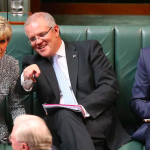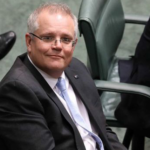Morrison to Silence Online Dissent Under Pretext of Protecting Against Trolls

Governments globally have found social media a prickly beast to deal with, as it’s provided those not usually afforded a voice in the mainstream media with a platform and an audience where they can express opinions, without being filtered through editorial departments prior to posting.
This has meant that online criticism of government has been rife. And the key Australian politician who’s been expressing umbrage about the ability of online critics to convey their political opinions has been defence minister Peter Dutton.
Last April, online critics reported having received letters from his legal representatives. The minister then successfully sued refugee advocate Shane Bazzi over labelling him a “rape apologist”. And Dutton has further suggested establishing a legal fund for politicians to pursue defamation cases.
So, it’s with this mounting online criticism in mind, that the Liberal Nationals government released its exposure draft of the Social Media (Anti-Trolling) Bill 2021 on 1 December.
Prime minister Scott Morrison, however, has been spruiking these laws designed to force social media companies to provide the true identity of hidden online critics, as being measures to combat “horrific abuse and harassment and stalking online”, and in particular, the ability to “harass women”.
In contrast, online rights advocates have been screaming from the rooftops that this bill has nothing to do with protecting average Australians from online abuse, but rather it’s all about enabling politicians, like Dutton, to uncover anonymous critics, so they can then take legal action.
A ruse at best
“First of all, most online abuse isn’t defamatory, so it will be completely unaffected by this legislation,” advised ANU Research School of Computer Science’s Dr Vanessa Teague. She outlined whether that be racist, sexist, transphobic, threatening or in any other form of online vitriol.
“Much of this is not anonymous now, but continues anyway, so removing anonymity would not make any difference,” the academic told Sydney Criminal Lawyers.
So, while the PM asserted that the new laws are all about protecting kids and women from an online environment that social media companies have turned into a “coward’s palace, where the anonymous can bully, harass and ruin lives without consequence”, they do nothing of the sort.
According to Teague, even in cases where online abuse is found to be slanderous, those targeted need to have the financial capacity to mount a defamation lawsuit to counter it. And therefore, in relation to “most regular people” this will be “out of reach”.
“The bill will make it much easier for the already-powerful to initiate defamation action against people who seem to be in Australia and have made accusations against them online,” the doctor made clear.
The guts of the bill
The Anti-Trolling Bill initially overrides the High Court ruling in last year’s Fairfax Media Publications versus Voller, which found social media page owners are the publishers of third-party comments posted to their pages. The legislation shifts this liability burden onto social media companies.
In terms of when an anonymous defamatory comment is posted, the bill would establish a system whereby the subject of such a comment could apply to a court for an end-user information disclosure order, which forces the social media company to reveal a user’s true identity.
This provision requires that social media companies obtain the “relevant contact details” of all Australian users, which can then be handed over and, in turn, absolves them of any liability for the comments in question.
This would require companies, like Facebook and Twitter, to verify the details of users, which would include their name, the name they’re usually known by, their email address, their phone number, and perhaps other details “as specified in the legislative rules”.
In terms of foreign social media companies with over 250,000 local users, they would be required to establish a “nominated entity” in Australia that’s capable of dealing with issues arising from the proposed laws, which would mean an Australian incorporated agent with a local office.
The bill further sets up a defence for social media companies over potentially defamatory comments, which involves having a complaints scheme, where a suspect comment is removed, the location of the commentator is revealed, along with their details if in Australia within a 72 hour period.
Five eyes overreach
These “anti-trolling” laws are unprecedented globally. And just like the encryption-busting laws contained in 2018’s TOLA Act, it’s unlikely that these sorts of laws would be passed in other Five Eyes security alliance nations, like the US, the UK, Canada and New Zealand.
“Unlike all other Five Eyes countries, Australia has no fundamental human rights charter,” explained Teague. “Legislated violations of basic rights, such as privacy and free speech, would not necessarily be adopted in other jurisdictions with constitutional protections of these rights.”
“The USA, for example, has never adopted anything like the worst provisions of the TOLA,” she continued.
The TOLA Act is Dutton’s handywork. It provides a framework enabling law enforcement to get around the encrypted messaging systems of communications providers. And the laws are thought to have extended the reach of US law enforcement agencies during a global crime sting last year.
Electronic Frontiers Australia board member Paul Ruberry drafted his organisation’s submission on the Anti-Trolling Bill. And he points out that the laws in the new bill differ from those in the TOLA Act as they deal with civil liability, rather than law enforcement and intelligence.
“If I were to draw a through line,” Ruberry added, “I would say that the “anti-trolling” bill would strengthen TOLA by forcing social media companies to have a local legal entity and to be subject to service.”
In an election year
As part of its consolation process on the draft bill, the Attorney General’s Department has received a swag of submissions with various entities making clear that their assessment of the bill turns up no real protections from online abuse, but rather enhances defamation law.
And in stark contrast to the PM’s spiel, when questioned by the Select Committee on Social Media and Online Safety last week, the AG’s Defamation Taskforce assistant secretary Michael Johnson said, “The bill is about defamation and it is not intended to address broader types of online harm.”
Indeed, while the PM wants us to believe the laws are all about protecting the vulnerable who aren’t empowered to take action against the very real harm of online abuse, it will rather enhance the ability of politicians like Dutton and John Barilaro and Andrew Laming, who want to silence critics.
“The bill therefore seems extremely unlikely to have much impact on online abuse of ordinary people,” Dr Teague concluded.
“I’m concerned that it will make it much easier for powerful people to threaten those who criticise or embarrass them online, and that this is particularly serious in an election year.”







